Taxation Law Assignment: Income Assessment and Tax Implications
VerifiedAdded on 2023/01/11
|7
|1227
|118
Homework Assignment
AI Summary
This taxation law assignment addresses the assessment of income derived from employment, examining various income sources such as wages, tips, bonuses, and gifts. The assignment analyzes the assessability of these income streams under the ordinary concepts of "section 6-5, ITAA 1997", referencing relevant case law like "CT v Scott (1935)", "Calvert v Wainwright (1947)", and "Kelly v FCT (1985)". It explores the application of these principles to a scenario involving an employee, Andrew, and assesses the tax implications of his earnings, including salary, tips, awards, and gifts. The analysis differentiates between assessable income and non-assessable items, such as prizes not related to employment, and applies the principles to determine Andrew's tax liability. The assignment concludes that Andrew is taxable on his earnings, based on the application of the ordinary income concept within the relevant tax legislation.
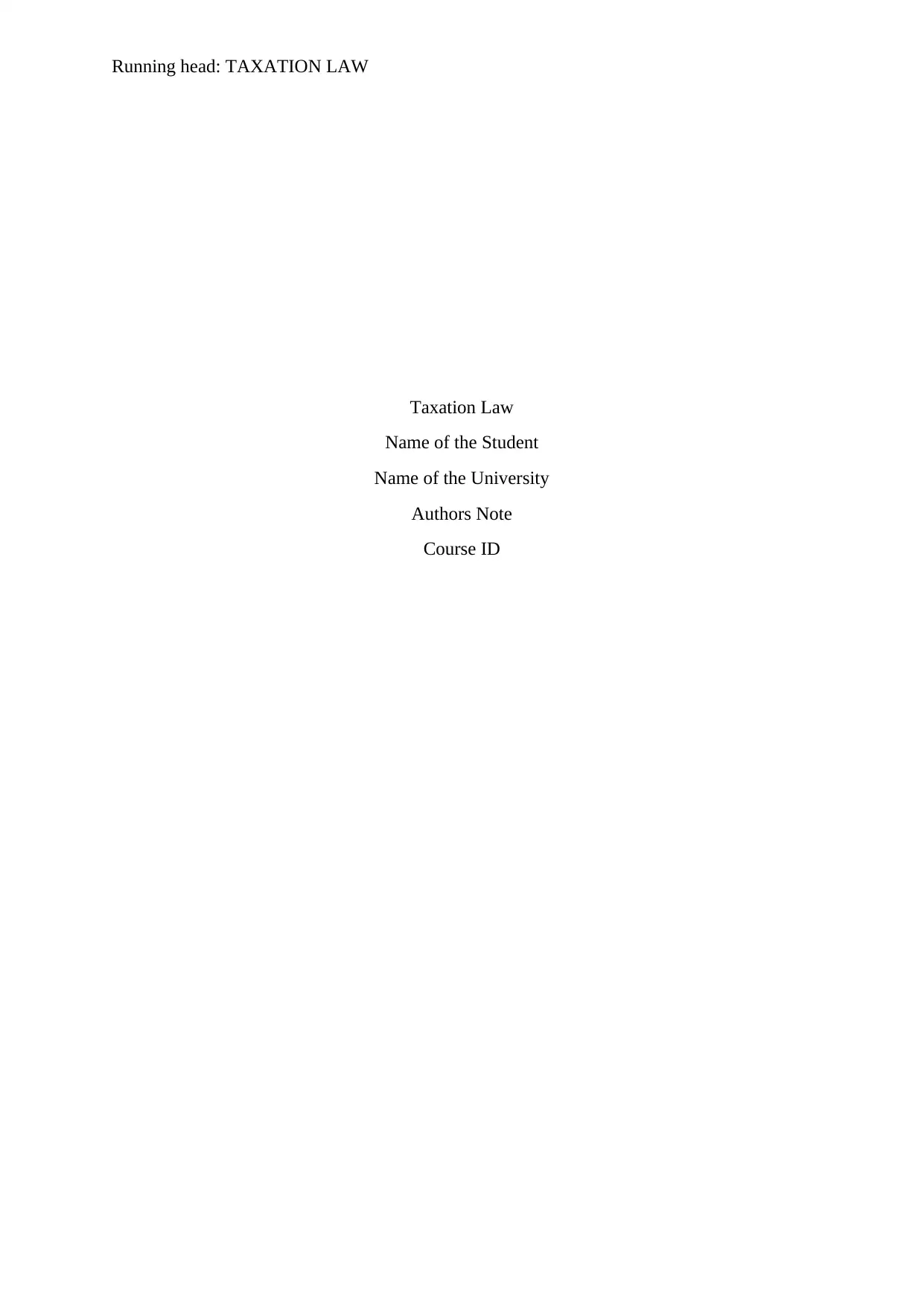
Running head: TAXATION LAW
Taxation Law
Name of the Student
Name of the University
Authors Note
Course ID
Taxation Law
Name of the Student
Name of the University
Authors Note
Course ID
Paraphrase This Document
Need a fresh take? Get an instant paraphrase of this document with our AI Paraphraser
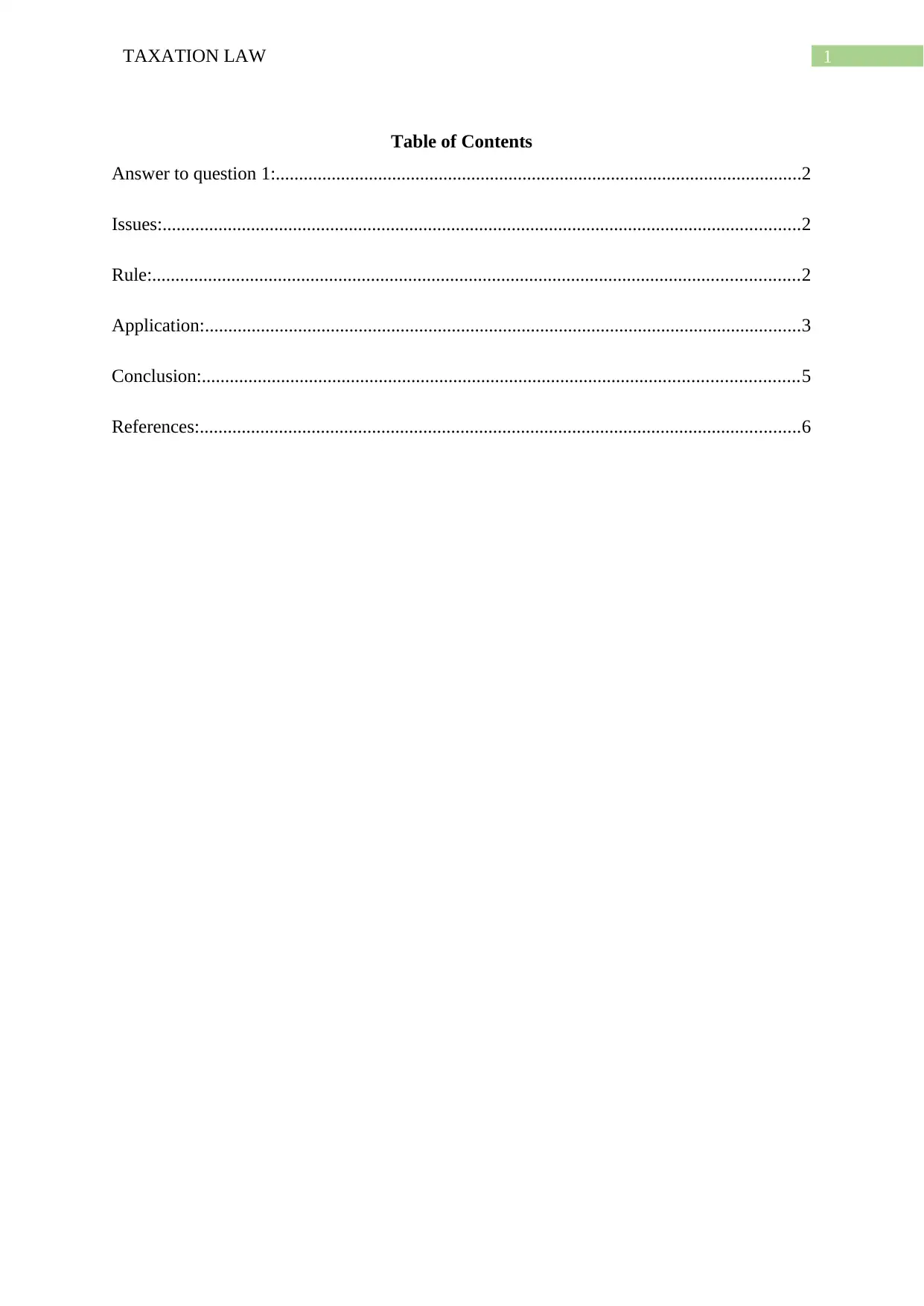
1TAXATION LAW
Table of Contents
Answer to question 1:.................................................................................................................2
Issues:.........................................................................................................................................2
Rule:...........................................................................................................................................2
Application:................................................................................................................................3
Conclusion:................................................................................................................................5
References:.................................................................................................................................6
Table of Contents
Answer to question 1:.................................................................................................................2
Issues:.........................................................................................................................................2
Rule:...........................................................................................................................................2
Application:................................................................................................................................3
Conclusion:................................................................................................................................5
References:.................................................................................................................................6
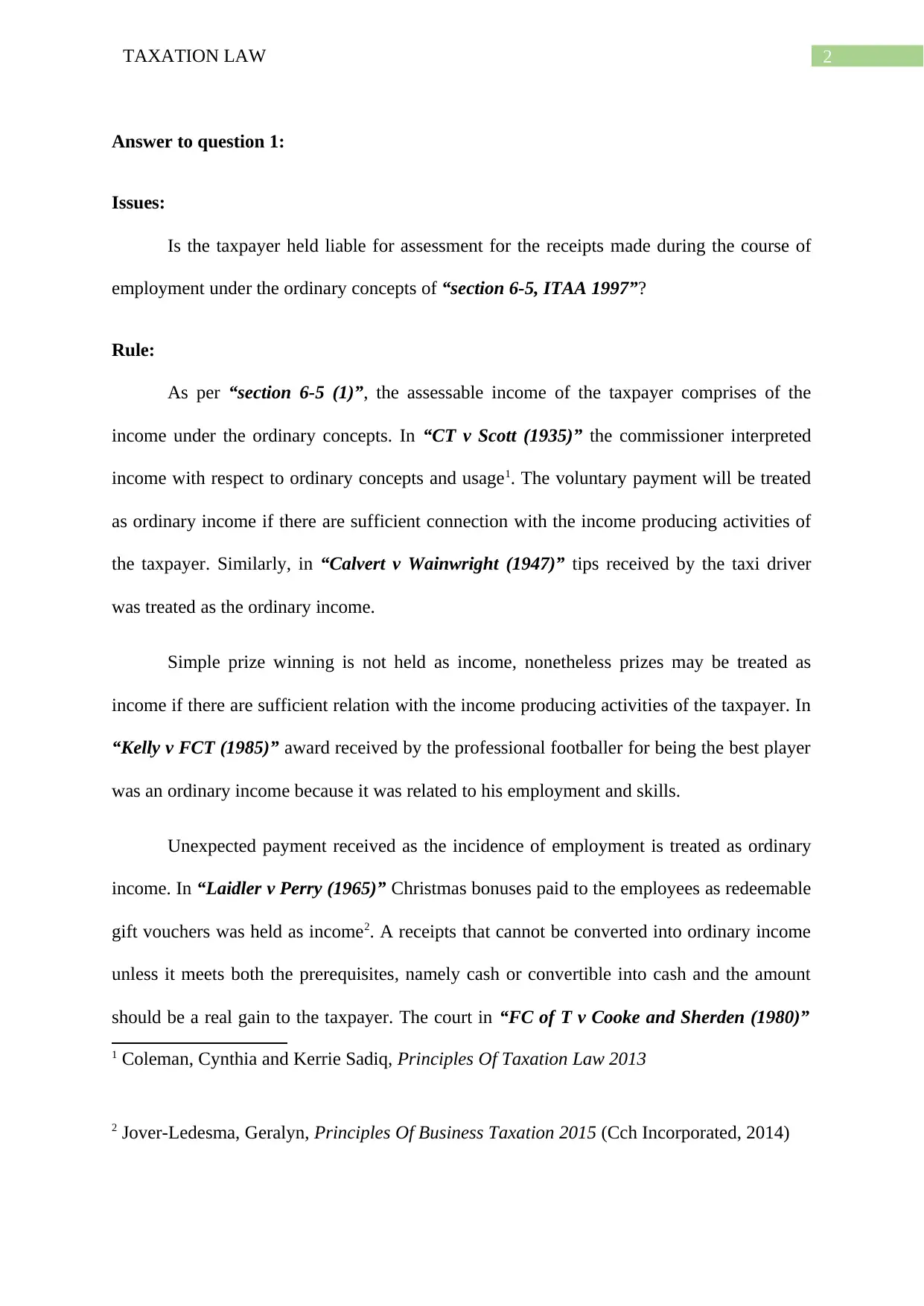
2TAXATION LAW
Answer to question 1:
Issues:
Is the taxpayer held liable for assessment for the receipts made during the course of
employment under the ordinary concepts of “section 6-5, ITAA 1997”?
Rule:
As per “section 6-5 (1)”, the assessable income of the taxpayer comprises of the
income under the ordinary concepts. In “CT v Scott (1935)” the commissioner interpreted
income with respect to ordinary concepts and usage1. The voluntary payment will be treated
as ordinary income if there are sufficient connection with the income producing activities of
the taxpayer. Similarly, in “Calvert v Wainwright (1947)” tips received by the taxi driver
was treated as the ordinary income.
Simple prize winning is not held as income, nonetheless prizes may be treated as
income if there are sufficient relation with the income producing activities of the taxpayer. In
“Kelly v FCT (1985)” award received by the professional footballer for being the best player
was an ordinary income because it was related to his employment and skills.
Unexpected payment received as the incidence of employment is treated as ordinary
income. In “Laidler v Perry (1965)” Christmas bonuses paid to the employees as redeemable
gift vouchers was held as income2. A receipts that cannot be converted into ordinary income
unless it meets both the prerequisites, namely cash or convertible into cash and the amount
should be a real gain to the taxpayer. The court in “FC of T v Cooke and Sherden (1980)”
1 Coleman, Cynthia and Kerrie Sadiq, Principles Of Taxation Law 2013
2 Jover-Ledesma, Geralyn, Principles Of Business Taxation 2015 (Cch Incorporated, 2014)
Answer to question 1:
Issues:
Is the taxpayer held liable for assessment for the receipts made during the course of
employment under the ordinary concepts of “section 6-5, ITAA 1997”?
Rule:
As per “section 6-5 (1)”, the assessable income of the taxpayer comprises of the
income under the ordinary concepts. In “CT v Scott (1935)” the commissioner interpreted
income with respect to ordinary concepts and usage1. The voluntary payment will be treated
as ordinary income if there are sufficient connection with the income producing activities of
the taxpayer. Similarly, in “Calvert v Wainwright (1947)” tips received by the taxi driver
was treated as the ordinary income.
Simple prize winning is not held as income, nonetheless prizes may be treated as
income if there are sufficient relation with the income producing activities of the taxpayer. In
“Kelly v FCT (1985)” award received by the professional footballer for being the best player
was an ordinary income because it was related to his employment and skills.
Unexpected payment received as the incidence of employment is treated as ordinary
income. In “Laidler v Perry (1965)” Christmas bonuses paid to the employees as redeemable
gift vouchers was held as income2. A receipts that cannot be converted into ordinary income
unless it meets both the prerequisites, namely cash or convertible into cash and the amount
should be a real gain to the taxpayer. The court in “FC of T v Cooke and Sherden (1980)”
1 Coleman, Cynthia and Kerrie Sadiq, Principles Of Taxation Law 2013
2 Jover-Ledesma, Geralyn, Principles Of Business Taxation 2015 (Cch Incorporated, 2014)
⊘ This is a preview!⊘
Do you want full access?
Subscribe today to unlock all pages.

Trusted by 1+ million students worldwide
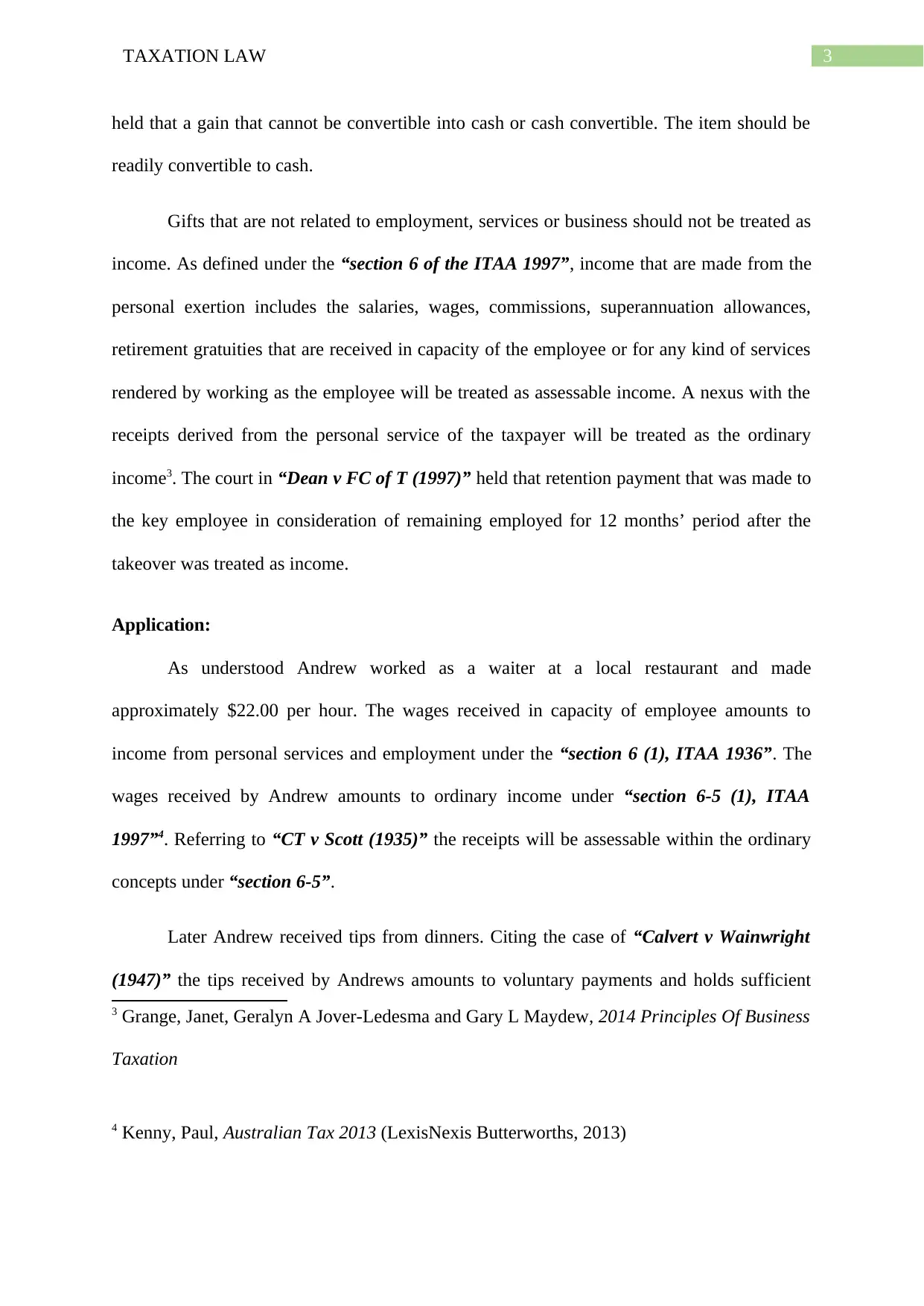
3TAXATION LAW
held that a gain that cannot be convertible into cash or cash convertible. The item should be
readily convertible to cash.
Gifts that are not related to employment, services or business should not be treated as
income. As defined under the “section 6 of the ITAA 1997”, income that are made from the
personal exertion includes the salaries, wages, commissions, superannuation allowances,
retirement gratuities that are received in capacity of the employee or for any kind of services
rendered by working as the employee will be treated as assessable income. A nexus with the
receipts derived from the personal service of the taxpayer will be treated as the ordinary
income3. The court in “Dean v FC of T (1997)” held that retention payment that was made to
the key employee in consideration of remaining employed for 12 months’ period after the
takeover was treated as income.
Application:
As understood Andrew worked as a waiter at a local restaurant and made
approximately $22.00 per hour. The wages received in capacity of employee amounts to
income from personal services and employment under the “section 6 (1), ITAA 1936”. The
wages received by Andrew amounts to ordinary income under “section 6-5 (1), ITAA
1997”4. Referring to “CT v Scott (1935)” the receipts will be assessable within the ordinary
concepts under “section 6-5”.
Later Andrew received tips from dinners. Citing the case of “Calvert v Wainwright
(1947)” the tips received by Andrews amounts to voluntary payments and holds sufficient
3 Grange, Janet, Geralyn A Jover-Ledesma and Gary L Maydew, 2014 Principles Of Business
Taxation
4 Kenny, Paul, Australian Tax 2013 (LexisNexis Butterworths, 2013)
held that a gain that cannot be convertible into cash or cash convertible. The item should be
readily convertible to cash.
Gifts that are not related to employment, services or business should not be treated as
income. As defined under the “section 6 of the ITAA 1997”, income that are made from the
personal exertion includes the salaries, wages, commissions, superannuation allowances,
retirement gratuities that are received in capacity of the employee or for any kind of services
rendered by working as the employee will be treated as assessable income. A nexus with the
receipts derived from the personal service of the taxpayer will be treated as the ordinary
income3. The court in “Dean v FC of T (1997)” held that retention payment that was made to
the key employee in consideration of remaining employed for 12 months’ period after the
takeover was treated as income.
Application:
As understood Andrew worked as a waiter at a local restaurant and made
approximately $22.00 per hour. The wages received in capacity of employee amounts to
income from personal services and employment under the “section 6 (1), ITAA 1936”. The
wages received by Andrew amounts to ordinary income under “section 6-5 (1), ITAA
1997”4. Referring to “CT v Scott (1935)” the receipts will be assessable within the ordinary
concepts under “section 6-5”.
Later Andrew received tips from dinners. Citing the case of “Calvert v Wainwright
(1947)” the tips received by Andrews amounts to voluntary payments and holds sufficient
3 Grange, Janet, Geralyn A Jover-Ledesma and Gary L Maydew, 2014 Principles Of Business
Taxation
4 Kenny, Paul, Australian Tax 2013 (LexisNexis Butterworths, 2013)
Paraphrase This Document
Need a fresh take? Get an instant paraphrase of this document with our AI Paraphraser
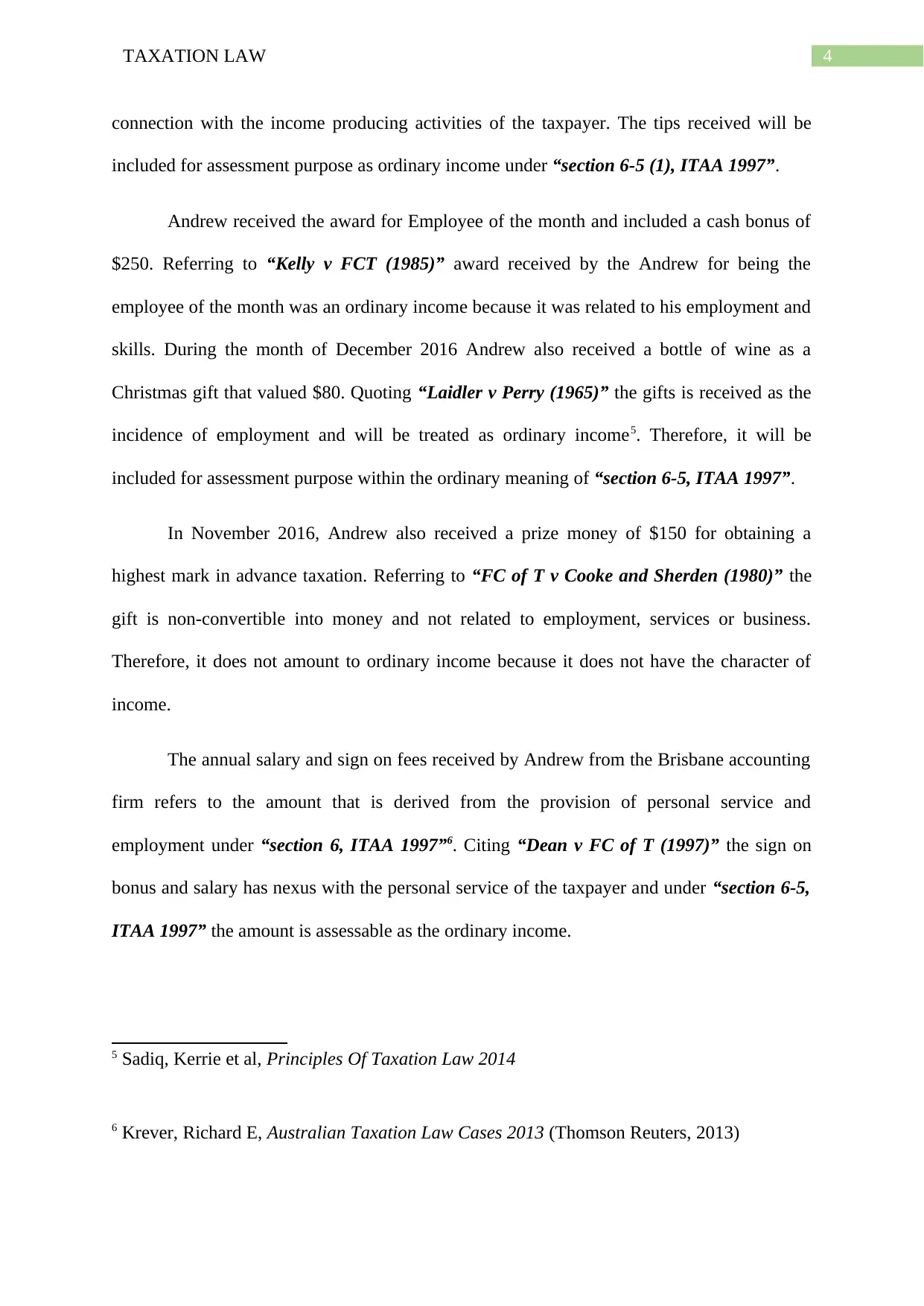
4TAXATION LAW
connection with the income producing activities of the taxpayer. The tips received will be
included for assessment purpose as ordinary income under “section 6-5 (1), ITAA 1997”.
Andrew received the award for Employee of the month and included a cash bonus of
$250. Referring to “Kelly v FCT (1985)” award received by the Andrew for being the
employee of the month was an ordinary income because it was related to his employment and
skills. During the month of December 2016 Andrew also received a bottle of wine as a
Christmas gift that valued $80. Quoting “Laidler v Perry (1965)” the gifts is received as the
incidence of employment and will be treated as ordinary income5. Therefore, it will be
included for assessment purpose within the ordinary meaning of “section 6-5, ITAA 1997”.
In November 2016, Andrew also received a prize money of $150 for obtaining a
highest mark in advance taxation. Referring to “FC of T v Cooke and Sherden (1980)” the
gift is non-convertible into money and not related to employment, services or business.
Therefore, it does not amount to ordinary income because it does not have the character of
income.
The annual salary and sign on fees received by Andrew from the Brisbane accounting
firm refers to the amount that is derived from the provision of personal service and
employment under “section 6, ITAA 1997”6. Citing “Dean v FC of T (1997)” the sign on
bonus and salary has nexus with the personal service of the taxpayer and under “section 6-5,
ITAA 1997” the amount is assessable as the ordinary income.
5 Sadiq, Kerrie et al, Principles Of Taxation Law 2014
6 Krever, Richard E, Australian Taxation Law Cases 2013 (Thomson Reuters, 2013)
connection with the income producing activities of the taxpayer. The tips received will be
included for assessment purpose as ordinary income under “section 6-5 (1), ITAA 1997”.
Andrew received the award for Employee of the month and included a cash bonus of
$250. Referring to “Kelly v FCT (1985)” award received by the Andrew for being the
employee of the month was an ordinary income because it was related to his employment and
skills. During the month of December 2016 Andrew also received a bottle of wine as a
Christmas gift that valued $80. Quoting “Laidler v Perry (1965)” the gifts is received as the
incidence of employment and will be treated as ordinary income5. Therefore, it will be
included for assessment purpose within the ordinary meaning of “section 6-5, ITAA 1997”.
In November 2016, Andrew also received a prize money of $150 for obtaining a
highest mark in advance taxation. Referring to “FC of T v Cooke and Sherden (1980)” the
gift is non-convertible into money and not related to employment, services or business.
Therefore, it does not amount to ordinary income because it does not have the character of
income.
The annual salary and sign on fees received by Andrew from the Brisbane accounting
firm refers to the amount that is derived from the provision of personal service and
employment under “section 6, ITAA 1997”6. Citing “Dean v FC of T (1997)” the sign on
bonus and salary has nexus with the personal service of the taxpayer and under “section 6-5,
ITAA 1997” the amount is assessable as the ordinary income.
5 Sadiq, Kerrie et al, Principles Of Taxation Law 2014
6 Krever, Richard E, Australian Taxation Law Cases 2013 (Thomson Reuters, 2013)
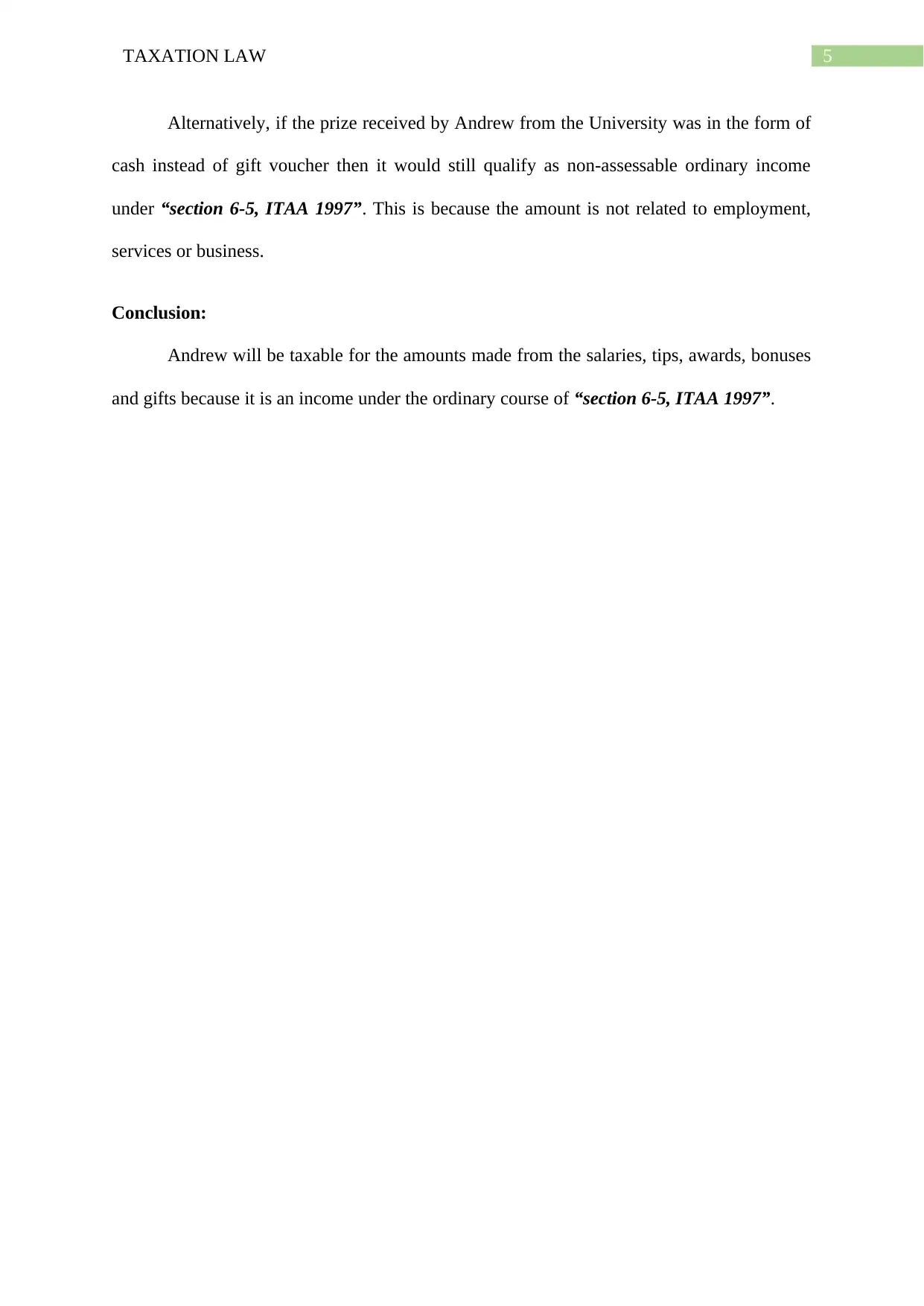
5TAXATION LAW
Alternatively, if the prize received by Andrew from the University was in the form of
cash instead of gift voucher then it would still qualify as non-assessable ordinary income
under “section 6-5, ITAA 1997”. This is because the amount is not related to employment,
services or business.
Conclusion:
Andrew will be taxable for the amounts made from the salaries, tips, awards, bonuses
and gifts because it is an income under the ordinary course of “section 6-5, ITAA 1997”.
Alternatively, if the prize received by Andrew from the University was in the form of
cash instead of gift voucher then it would still qualify as non-assessable ordinary income
under “section 6-5, ITAA 1997”. This is because the amount is not related to employment,
services or business.
Conclusion:
Andrew will be taxable for the amounts made from the salaries, tips, awards, bonuses
and gifts because it is an income under the ordinary course of “section 6-5, ITAA 1997”.
⊘ This is a preview!⊘
Do you want full access?
Subscribe today to unlock all pages.

Trusted by 1+ million students worldwide
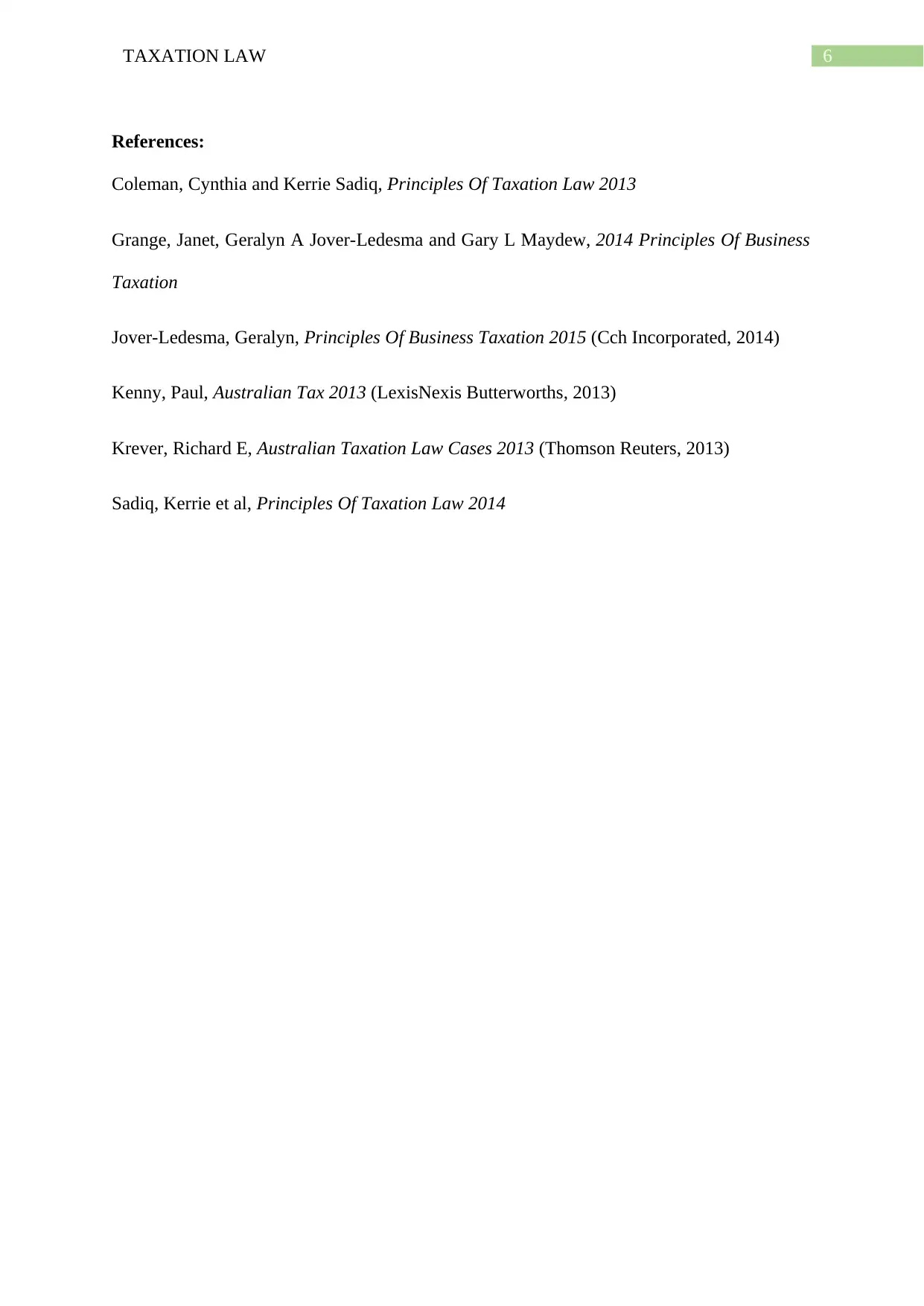
6TAXATION LAW
References:
Coleman, Cynthia and Kerrie Sadiq, Principles Of Taxation Law 2013
Grange, Janet, Geralyn A Jover-Ledesma and Gary L Maydew, 2014 Principles Of Business
Taxation
Jover-Ledesma, Geralyn, Principles Of Business Taxation 2015 (Cch Incorporated, 2014)
Kenny, Paul, Australian Tax 2013 (LexisNexis Butterworths, 2013)
Krever, Richard E, Australian Taxation Law Cases 2013 (Thomson Reuters, 2013)
Sadiq, Kerrie et al, Principles Of Taxation Law 2014
References:
Coleman, Cynthia and Kerrie Sadiq, Principles Of Taxation Law 2013
Grange, Janet, Geralyn A Jover-Ledesma and Gary L Maydew, 2014 Principles Of Business
Taxation
Jover-Ledesma, Geralyn, Principles Of Business Taxation 2015 (Cch Incorporated, 2014)
Kenny, Paul, Australian Tax 2013 (LexisNexis Butterworths, 2013)
Krever, Richard E, Australian Taxation Law Cases 2013 (Thomson Reuters, 2013)
Sadiq, Kerrie et al, Principles Of Taxation Law 2014
1 out of 7
Related Documents
Your All-in-One AI-Powered Toolkit for Academic Success.
+13062052269
info@desklib.com
Available 24*7 on WhatsApp / Email
![[object Object]](/_next/static/media/star-bottom.7253800d.svg)
Unlock your academic potential
Copyright © 2020–2026 A2Z Services. All Rights Reserved. Developed and managed by ZUCOL.





